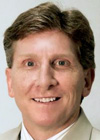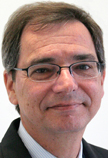Wichita State University has been awarded a $6.6 million federal grant for research that could help older women improve their chances of a healthy pregnancy.
The research could lead to home fertility tests as accurate, simple to administer and widely available as home pregnancy tests.
The five-year research project, developed and led by WSU professor George R. Bousfield, is being funded by the National Institutes of Health, the nation’s leading medical research agency.
The research in reproductive endocrinology centers on the potential of a novel form of FSH, follicle-stimulating hormone, to serve as a new and more accurate indicator of fertility in women 35 years and older. These are women beyond their prime biological childbearing years, but who may still want children.

J. David McDonald
McDonald said the grant recognizes both Bousfield’s research expertise and his determination to pursue scientific questions of importance to women and families.
“Throughout the United States and the developed world,” said McDonald, “women have decided to delay childbearing to later ages. When they’ve sought medical help, they and their physicians haven’t had reliable fertility tests. Dr. Bousfield and his colleagues have produced promising research that has the potential to help millions of women.”
Bousfield, as director of the Protein Core Laboratory at WSU, will lead a collaborative effort that includes researchers in laboratories here and at the University of Kansas Medical School in Kansas City, Kan., and at the University of Nebraska Medical School in Omaha, Neb., plus biological informatics support from KU in Lawrence.
William J. Hendry, WSU chairperson of biological sciences, said NIH-designated “program project” grants, like the one obtained by Bousfield, more commonly go to major medical school complexes.
McDonald called the grant “important national confirmation of WSU’s research leadership in the sciences.”
He said the grant would fund purchase and support of sophisticated laboratory equipment, extensive testing, and research positions for graduate and postgraduate students, as well as technicians.
Bousfield said he is collaborating with Wichita physicians on his research, including Drs. David Grainger and Bruce Tjaden, at the Center for Reproductive Medicine, and Dr. Edmond Feuille, at Preferred Medical Associates-Wichita OB/GYN Associates.
“The translation of Dr. Bousfield’s extraordinary bench research into clinical medicine promises to shed light on the reproductive aging process,” said Grainger, “and in so doing bring hope for women who have delayed childbearing. We are extremely excited to be participating in these novel studies.”
“This affirms what the Wichita community has long known about the quality of research going on at Wichita State University. Our state needs more collaborative efforts like this to begin to develop Kansas into a true biomedical research region,” said Peggy Johnson, CEO of the Wichita Medical Research and Education Foundation.

Gary L. Miller
“This is an excellent example of Wichita State’s growing role as the urban serving research university of Kansas,” said Miller. “As the medical center and population center of the state, it makes sense to base more medical research here.”
Bousfield said the most commonly used fertility test measures FSH in blood samples, in which quantity is highly variable over a short time span, leading to unreliable results. About 10 years ago, he began focusing on a novel form of this hormone that is also secreted by pre-menopausal women.
He believes the research, by focusing on hormones not fully understood, has the potential to improve both the accuracy of measuring fertility and the use of hormones to increase fertility in women who have had difficulty becoming pregnant.
He said that because fertility proceeds at a different pace than age, more accurate means of measuring it and understanding the contribution of hormones may lead to more effective treatments.

